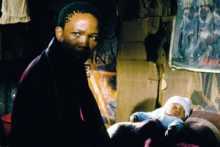You've heard about Tsotsi. It was nominated for a number of awards and also won an Oscar. It made such waves in the movie industry, or at least in part of it, that Gavin Hood was signed up for major flicks. Yes, let's not go into the epilogue; let's talk about Tsotsi.
What's the story like? In a nutshell, an angry, young hooligan, David, ends up taking care of a baby whose mother he kind of maimed in a robbery. Oh, and the police and other hooligans are out for him. I'll confess that the story is more complicated than that. The story links two vastly different worlds in South Africa - the poor folk who live in make-shift houses in townships and the super rich who in expansive home protected by barbed wire and hi-tech security fencing. and So, one of those bitter, hardened orphans goes off with his little criminally-minded group to get a chunk of what is entitled to them. Where do you find that? Behind the electric fencing, in that rich home of course. Well, these guys end up shooting a woman in an attempted robbery/hijacking and driving off with her car. Problem is, David finds that there's a baby in the car. And to his own surprise, he finds himself taking care of it. He does this in his own way; bullying a young mother in his neighborhood to feed and wash the baby. I suppose he tried. As the story progresses, David distances himself from his 'gang' and even gets into nasty fights with one. In the end, it's a matter of will he be caught and will he do the right thing?
I guess that brings up the vital question - why should you watch it? Firstly, I would argue that the story does not adhere to typical antihero depictions. As it is, I was somewhat disappointed to note that a certain percentage of foreign critics dismissed the main plot-line as cliche and just another take on an old theme. Fair enough, the man from the ghetto facing a moral dilemma is an age old story; we've come across it way too many times. In most cases, it is probably Nicholas Cage with a receding hairline.
What's interesting in this case is the fact that the antihero's actions or behavior was never glamorous. Sure, a number of times, the direction and content evoked sympathy from us; we felt sorry for his sad childhood and it was disconcerting to know he was one of the many who are struggling for their basic human needs in South Africa. But at no point did the director and writer flesh him out as a cool-to-emulate character. None of his actions were sensationalized. There were no monosyllabic phrases that was meant to show him as a desirably macho man. The fight scenes were ugly and somewhat realistic and showed violence for what it was - dirty, out of control and life-changing.
Secondly, the movie is a rather accurate depiction of life in South Africa. There is nothing cliche about the backdrop of the movie. It provides a fascinating insight into social situation, be it the disparity between rich and poor, the crazy crime situation there or even the simple fact that despite all these problems, the country is thriving and growing with the times. That last phrase meant for those who dismiss the country as just another little nation living in little huts. While we are on the topic, I must note that the movie depicts the violent crime situations rather well. Did you notice that bit where the same house was hit twice by the robbers? Would it scare you if I said that in South Africa people really do watch where you go, how often you leave your house and where you work? This is a frightening little insight into that aspect of the South African life.
